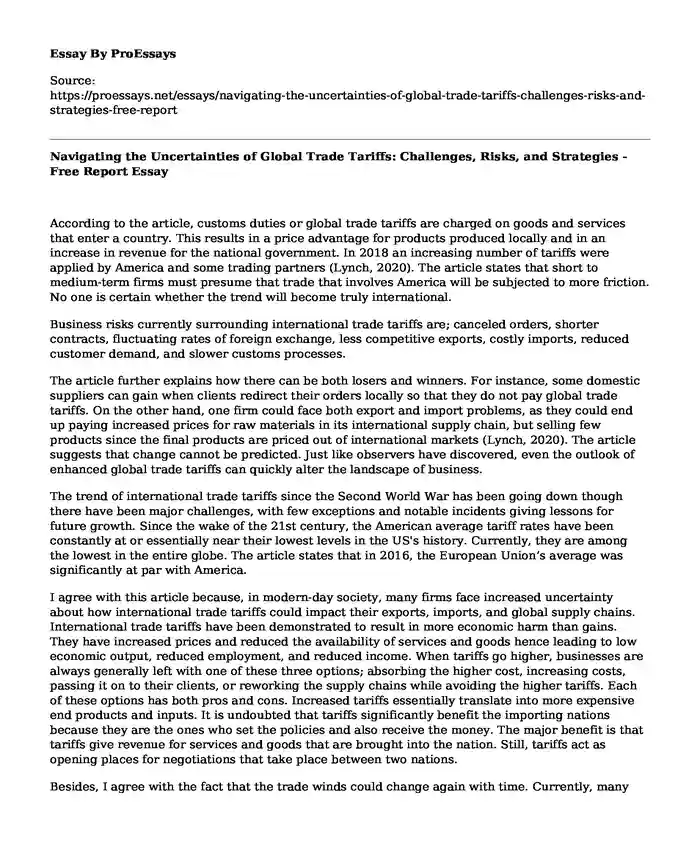According to the article, customs duties or global trade tariffs are charged on goods and services that enter a country. This results in a price advantage for products produced locally and in an increase in revenue for the national government. In 2018 an increasing number of tariffs were applied by America and some trading partners (Lynch, 2020). The article states that short to medium-term firms must presume that trade that involves America will be subjected to more friction. No one is certain whether the trend will become truly international.
Business risks currently surrounding international trade tariffs are; canceled orders, shorter contracts, fluctuating rates of foreign exchange, less competitive exports, costly imports, reduced customer demand, and slower customs processes.
The article further explains how there can be both losers and winners. For instance, some domestic suppliers can gain when clients redirect their orders locally so that they do not pay global trade tariffs. On the other hand, one firm could face both export and import problems, as they could end up paying increased prices for raw materials in its international supply chain, but selling few products since the final products are priced out of international markets (Lynch, 2020). The article suggests that change cannot be predicted. Just like observers have discovered, even the outlook of enhanced global trade tariffs can quickly alter the landscape of business.
The trend of international trade tariffs since the Second World War has been going down though there have been major challenges, with few exceptions and notable incidents giving lessons for future growth. Since the wake of the 21st century, the American average tariff rates have been constantly at or essentially near their lowest levels in the US's history. Currently, they are among the lowest in the entire globe. The article states that in 2016, the European Union’s average was significantly at par with America.
I agree with this article because, in modern-day society, many firms face increased uncertainty about how international trade tariffs could impact their exports, imports, and global supply chains. International trade tariffs have been demonstrated to result in more economic harm than gains. They have increased prices and reduced the availability of services and goods hence leading to low economic output, reduced employment, and reduced income. When tariffs go higher, businesses are always generally left with one of these three options; absorbing the higher cost, increasing costs, passing it on to their clients, or reworking the supply chains while avoiding the higher tariffs. Each of these options has both pros and cons. Increased tariffs essentially translate into more expensive end products and inputs. It is undoubted that tariffs significantly benefit the importing nations because they are the ones who set the policies and also receive the money. The major benefit is that tariffs give revenue for services and goods that are brought into the nation. Still, tariffs act as opening places for negotiations that take place between two nations.
Besides, I agree with the fact that the trade winds could change again with time. Currently, many companies are petitioning to preserve open trade. Indeed, a positive and ambitious plan is required to ensure that every business is ready to avoid trade frictions resulting in economic distractions. As the article states, I believe that taking proactive and preventive actions, finding ways of mitigating risks, seizing competitive advantage, and assessing the exposure of a firm's entire value chain would be critical in addressing the uncertainty in global trade tariffs.
Reference
Lynch, K. (2020). Managing International Trade Tariffs | American Express. Retrieved 6 October 2020, from https://www.americanexpress.com/us/foreign-exchange/articles/managing-international-trade-tariffs/
Cite this page
Navigating the Uncertainties of Global Trade Tariffs: Challenges, Risks, and Strategies - Free Report. (2024, Jan 09). Retrieved from https://proessays.net/essays/navigating-the-uncertainties-of-global-trade-tariffs-challenges-risks-and-strategies-free-report
If you are the original author of this essay and no longer wish to have it published on the ProEssays website, please click below to request its removal:
- The United States Should Advocate for Electric Vehicles and Ban Gasoline Cars
- Trade Barriers and Tariff Barrier Paper Example
- Demographic Analysis of Polk County - Essay Sample
- Argumentative Essay on Hollitz Ch. 9
- Globalization: Assignment Example
- Employee Benefits: Attracting & Retaining Highly-Skilled Employees - Essay Sample
- Essay Example on History of the US: From Mexico to Freedom from Slavery







